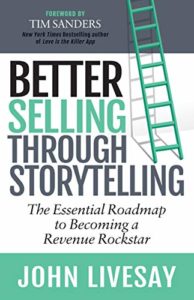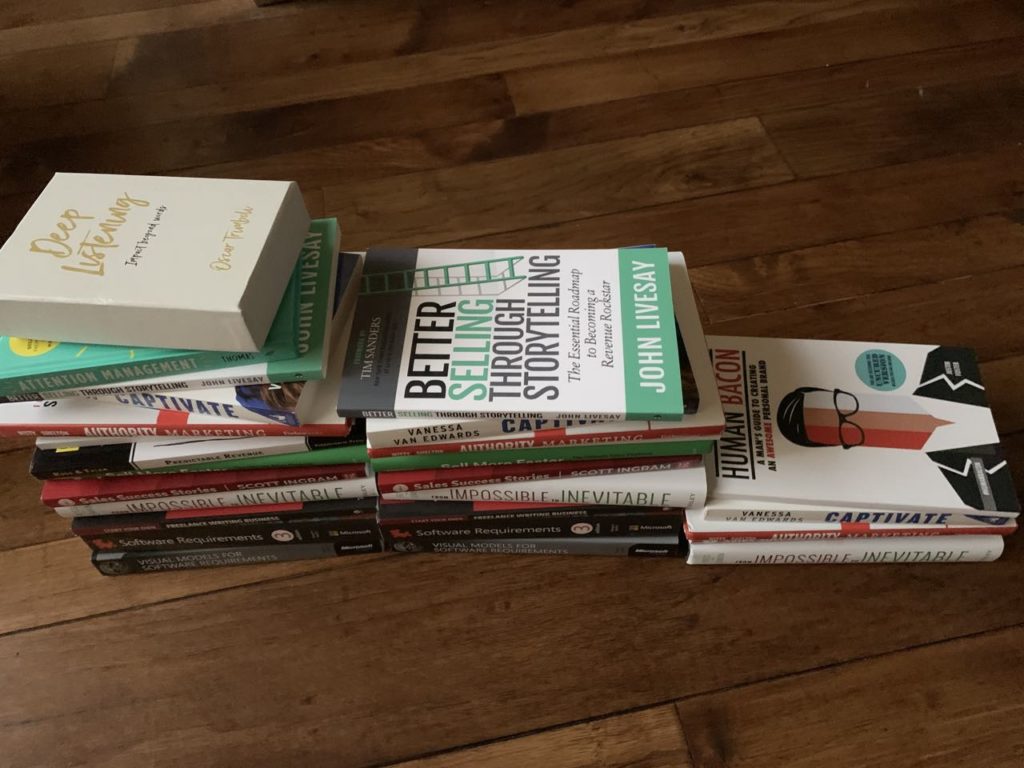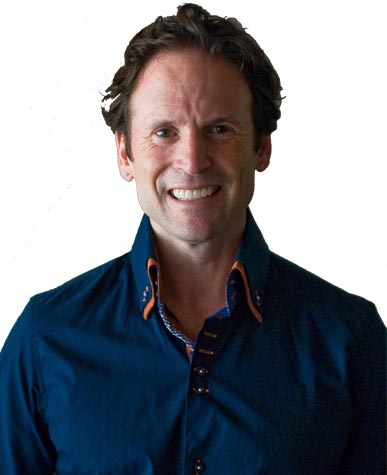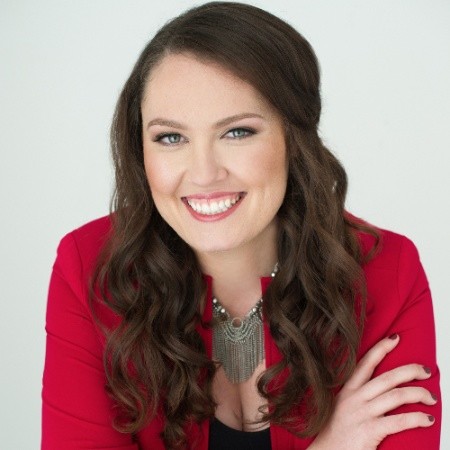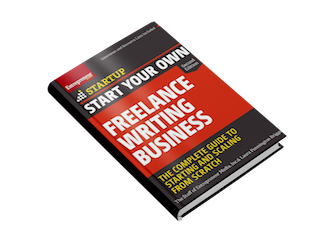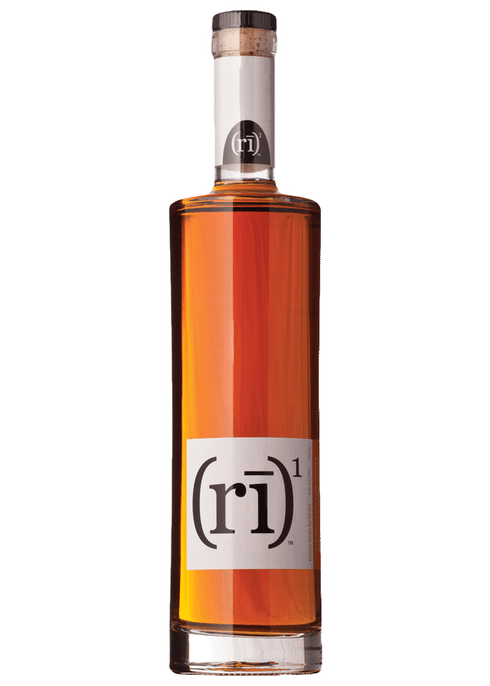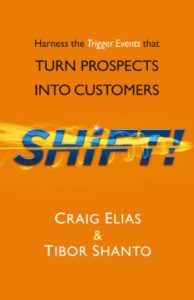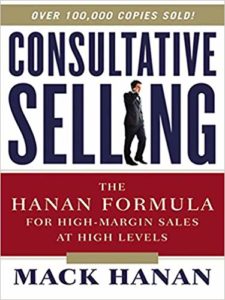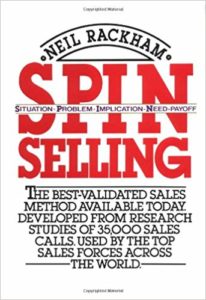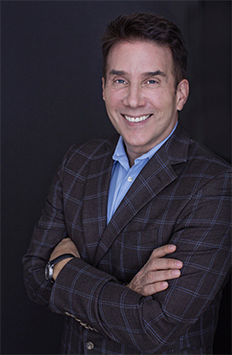
John Livesay becomes the second guest to return to Sales for Nerds (catch his earlier episode on how to pitch here). Now he’s back to talk about “Better Selling through Storytelling”, which of course is the name of his new book.
In this episode, John goes into why storytelling is so important (it’s how we actually learn and communicate, not just by dumping facts on people), and how to do it effectively. In particular, John goes into:
Story Structure
Each story has a framework.
- Exposition (the who, what, when, where, why)
- The problem– if there’s no problem, there’s no drama
- The solution
- And the resolution– what life is like after the solution
How to Move up the “5 I’s” Ladder (whether in sales or in the dating world)
- Invisible
- Insignificant
- Interesting
- Intriguing
- Irresistible
Note that most small business are stuck on the first 2 rungs.
The way to move up the ladder is to tell stories (you may have heard them called “case studies”) about one person so that other people can see themselves in the story. These stories will find their way to your buyers and pull them in if you do a good job.
Of course, this means picking your niche so that your story resonates with the other people in that niche. Don’t worry about going too narrow (this should sound familiar from Aaron Ross’s advice on nailing your niche). Your story will still resonate, just not as powerfully, with nearby niches. This is still better than telling a more generic story that applies to everyone, but resonates with no one.
To all the way to the top of the ladder, John (of course) tells the story of meeting Michael Phelps, and how his coach asked if he was willing to train on Sundays. When Michael said that we he was, the coach said, “great, now we have 52 more training sessions than the other swimmers.” This is John’s way of getting us to think about what we can do or offer that no one else can.
Weaving stories together
The buyer wants to see their story in your story about other buyers. They also need to know your story (although we typically focus too much on this part, and not enough on the others). So how do we weave these stories together?
First consider 3 unspoken questions a prospect has. Not: do I know, like, and trust you? But: do I trust, like, and know you? In other words, do I trust you enough to even listen to anything you have to say? Then, do I like you enough to want to listen? And finally, moving from the gut, to the heart, to the head, do I know you (and that you can do the job)?
If you can do that, you can use the case study to weave the stories together.
In this age of more and more information and technology, storytelling is more important than ever, but in John’s view, everyone can be a good storyteller.
Handling the negatives
Don’t get put off by objections– they are buying signals. And don’t forget that it’s not the job of your prospects, strangers, or even your kids to make you feel good. As John writes, “that’s why they call it self-esteem.”
Side note: some slides I often like to use:
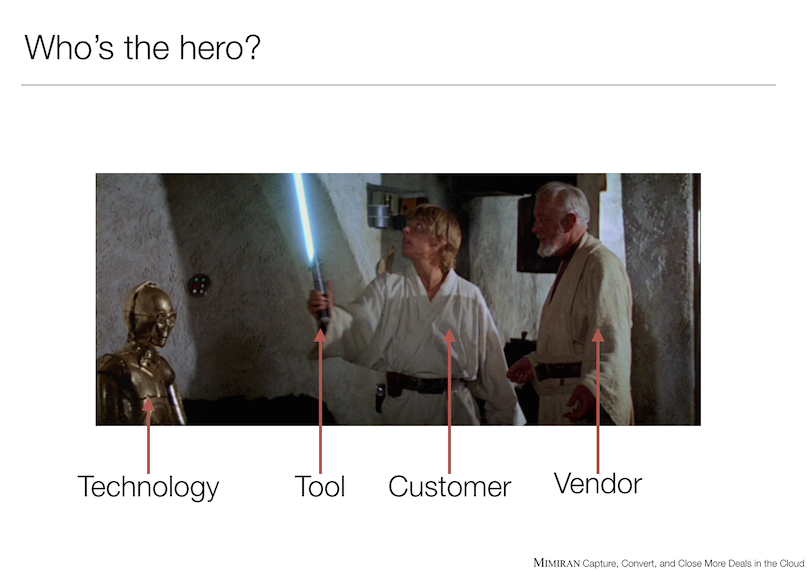

The Wine (& Whisky)
John enjoys some Stag’s Leap Chardonnay.
Earlier that morning, I’d had a wisdom tooth out. They told me to avoid alcohol for a couple of days (not because of any health issues, but because it would hurt). I was tempted to just skip having a drink with John, but that didn’t seem right. I also didn’t want to open a bottle of wine if it was too painful to drink. So I decided to have a sip of whisky as a test. All good. So I had a glass of Caol Ila Islay 12 year old scotch.
(I was trying extra hard to concentrate and felt that I wasn’t doing a great job, but John said it was a good conversation.)
Where to find John…
- https://www.johnlivesay.com
- @thepitchwhisperer on Instagram (I think this is first guest to have an Instagram profile)
- @John_Livesay on Twitter
Get John’s book: Better Selling through Storytelling
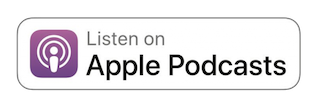
Where you can find Reuben: @Sales4Nerds, @Mimiran, Mimiran.com (the easy CRM for people who are awesome at serving clients and would love some help getting more, but hate “selling”). You can also listen on Overcast, or Subscribe on Android, or Player.fm.
Also, if you can get a free “fill in the blank” hero proposal template. Remember, a proposal is a story, not a brochure.
If you’ve ever struggled with a proposal, check out the “official” Sales for Nerds online course on Sales Proposals the Right Way (coupon link for listeners).
Get alerted when there are new episodes (1x/month):
